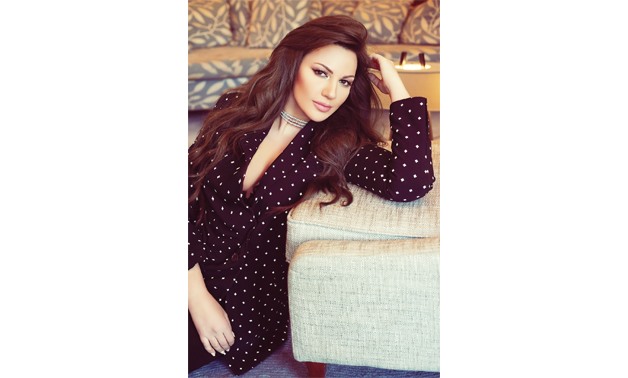
Rising Lebanese starlet Darine Hamze received the Best Actress Award for her role in the action comedy - Nuts - Pic courtesy Darine hamze
This summer, Lebanese rising starlet Darine Hamzé received the Best Actress Award at the 10th edition of Oran International Arabic Film Festival for her role in the action comedy Nuts where she plays a strong-willed mother and wife, Lana, who takes up gambling against her husband’s will as well as that of professional poker players taking part in underground games organized by the mob across Lebanon.
“What I liked about Lana is that she was a tough woman, and had a sharp edge to her.
She portrayed an addiction to risk, which I personally think is usually portrayed for male heroes and rarely for women. This made her different and fearless and that drew me to playing her character,” Hamzé says. Hamzé also served as co-writer, co-producer and casting supervisor for Nuts, French filmmaker Henri Bargès’ directorial debut. “The award meant a lot for me since it came from a country I visited for the first time, [and one that is] rich in history and intellect. It was an honor, really, and a delight.”
Born in the middle of the Lebanese civil war, a young Hamzé was sent to a private boarding school in London. Hamzé then received a bachelor’s degree in drama at the Institute of Fine Arts in Lebanon in 2002 before receiving a master’s in arts and media practice from London’s University of Westminster. Her academic background in the theater and her love for the arts has since then pushed her to pick diverse roles and languages, collaborating with filmmakers from around the world. In fact, her film debut in 2009 required her learning Persian to lead the cast of the Iranian-acclaimed long narrative film The Book of Law, co-staring the legendary Iranian actor Parviz Parasui and directed by Maziar Miri. The film was Hamzé’s first brush with media scrutiny for controversially criticizing the way Islam is being practiced erroneously in certain Iranian regions. She then had to brush up on her French and take singing classes for her role as Zoha in yet another controversial film, the 2011 Beirut Hotel, co-starring French actor Charles Berling. Directed by Danielle Arbid, the film revolved around Zoha, who is a wildly romantic club singer who falls in love with a French spy. Hamzé recorded the whole soundtrack for the film, which was banned in Lebanon due to suggestive scenes depicting the Lebanese government as covering up information pertaining the assassination of former Prime Minister Rafik Harriri. The film, however, was eventually aired on the German-French cultural channel Arté, leading to further backlash from the press and the public over Hamzé’s love scene with the French actor.
Hamzé came to the attention of international audiences in 2016 with her performance in the Lebanese-German film Halal Love, a social comedy directed by Assad Fouladkar, the Lebanese director known to Egyptian audiences for the long-running sitcom A Man and Six Women. Halal Love was produced by Razor Films and went on to be screened at several international festivals, including Sundance Film Festivals, Hamptons International Film Festival and Cairo International Film Festival. In the film, Hamzé depicted the role of the dreamy Loubna, a young divorced Muslim woman trying to live her life and desires without breaking any of her religions rules, which drove her to accept a “pleasure marriage” for a short while. Her performance landed her a Best Actress Award from the 2016 edition of the Fukuoka International Film Festival in Japan.
She continues taking on challenging, politically unaccepted, out-of-the-box roles in the region, with her latest this year being Nuts, which premiered at the Dubai International Film Festival.
Hamzé also played an important role in the TV series People of Alexandria (2014) along with Amr Waked and Hesham Selim. The series, though produced by the state-owned Egyptian Media Production City, was reportedly banned from being broadcast for three years, possibly due to the filmmakers’ political beliefs.
After Oran, Hamzé is returning to Beirut where she will continue writing a romantic comedy to produce through her own company and in which she will eventually star. The rising starlet has hopes too that Egyptian film producers who brought many actresses from Lebanon will cast her in a challenging new role. et


Comments
Leave a Comment